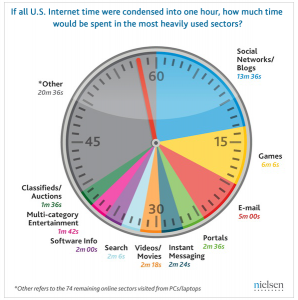The distractions of the internet are never-ending. Between social media, online articles, email, and instant messaging, one can waste hours of potentially productive time on essentially useless browsing. The graphic provided from Nielson research shows the average ways in which we use the internet. We are all guilty of the internet time-such, but some have more trouble with it than others. In order to curb this potentially detrimental habit, we have a few strategi es:
es:
1) Determine Why: There is usually a reason why you are drawn into the distraction of internet surfing. Perhaps its boredom, perhaps attention-deficit, or maybe it’s a stress reliever. However, if you understand the why, you can more easily shift the habit into something productive. For example, if you are distracted by internet surfing due to boredom, consider instead switching to a new work task that will re-engage your interest. If you’re looking for mindless stress-relief, perhaps a quick walk outside the building would provide a healthy release.
2) Internet Breaks: If you absolutely need a internet break, determine how much time you can afford to browse and set a timer to keep you to it. The site http://minutes.at/ offers a free timer service that allows you set hard time limits per site. When your time is up, use an app, such as Pocket, to bookmark any pages that you’d like to come back and read later, so that you aren’t tempted to stay a bit longer.
3) Total Browsing Limits: If you are the kind of person who finds themselves lost online for several hours a day, consider setting a weekly internet time allotment. For example, if it’s not for work or school, you will only allow yourself 2 hours per week of browsing time. Keep track of your total on a notepad or phone timer app.
4) Minimize Opportunity: If you are under deadline or need to concentrate on something at work, turn off access to internet distractions. Close down your browser window, turn off instant messaging, and silence your phone from receiving social media notifications. This strategy also works if you need the internet to complete part of the task. The difference is that you do all of your online research first, copy the information to an offline source and then close down the browser to complete the work.
5) Block Access: If you just can’t trust yourself to follow the above suggestions, there is a more serious option available. Services such as, Leech Block for Firefox and Chrome Nanny for Google Chrome allow you to set preferences of which sites will be unavailable for access during which times per day.
Although internet browsing can be a very enjoyable and appropriate activity, there are certainly times that all of us have stayed a bit too long. Hopefully with these tips, we can maximize efficiency and minimize the time-suck.


Speak Your Mind